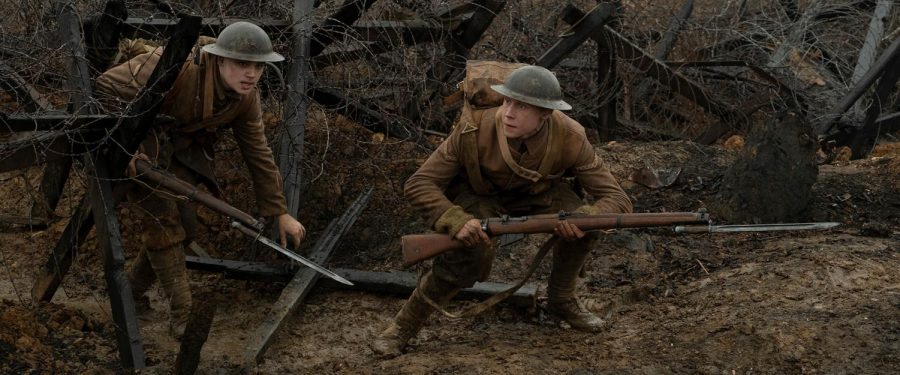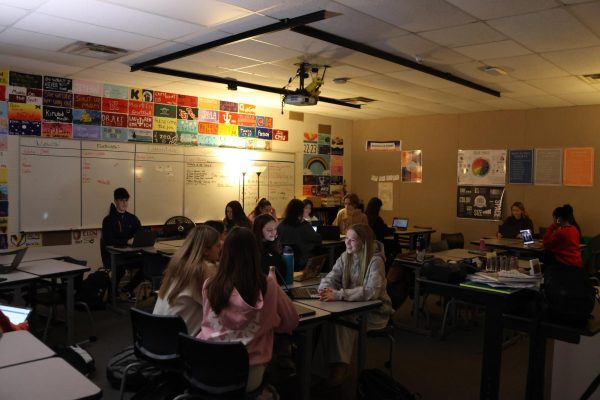Review: “1917”
Photo by Universal Pictures
Two years ago, I got up on a Sunday to pick up a friend and drive to Cantigny Park, arriving around 10 a.m. It was a bit blustery and cold — at least enough to numb hands that weren’t buried in pockets — but the occasion was special. The date: November 11, 2018. At 11 a.m. it would be 100 years since the end of a war that defined the bloody nature of modern warfare. That entrance into the modern era would change not only the world, but the generation that was shredded by shrapnel. That was what brought a small crowd to a park named after a commune in France. That was the respect in celebrating the centenary of the end of World War I that is carried in “1917.” Director Sam Mendes’ new World War I film turns that respect into a fictional drama, combining distant memory and historical record into a portrayal of emotions no living person can describe.
The film is an intimate and personal experience that routinely displays humanity in its rawest form, making its Golden Globe accolades well-deserved. However, awards season buzz or my personal enthusiasm for the setting should not be mistaken as reason to dismiss this movie as artsy-fartsy — as some now accuse Mendes’ debut “American Beauty” of since its 1999 release. Anyone, whether an expert of the Great War or someone who didn’t know World War I was called that, can appreciate how the cast and crew immerse audiences in the mud and blood.
The movie follows two British soldiers in France, Lance Corporal Blake (Dean-Charles Chapman) and Lance Corporal Schofield (George MacKay), on their desperate mission behind enemy lines to relay a message canceling an attack that will send hundreds (including Blake’s brother) into a trap. It’s a simple story, and narrative-wise there is nothing too complicated. The same can’t be said for the filmmaking.
Mendes works with a crew he knows. Cinematographer Roger Deakins worked on “Skyfall” (2012) and “Jarhead” (2005). The flashy, long and indulgent shots of “Blade Runner 2049” (2017) that earned Deakins’ first Oscar are very much alive here. With “1917,” the flashy, long and indulgent comes in the one-shot feel. That’s how one might approach this movie: that the “one shot” is a gimmick, or simply another trendy movie meant to look like it was shot in one take. In the context of the story being told and marvels of cinematography on display, it proves it’s exactly what this story needs. The technique puts the viewer in the thick of cramped trenches, bombed-out ruins and every precarious scenario that Blake and Schofield happen across. In addition, it helps give context to a long journey that has a real sense of scale. Having scenes nonchalantly filled with corpses or masses of extras lacks overwhelming showmanship — even giving a scenes of warfare such beauty that it’d be best to not have them spoiled by any trailers. The Thomas Newman (another who worked with Mendes before) score helps to amplify scenes with some typical emotional stings, but also some stand-outs accompanying the best parts of the movie — doing what’s required to tick through tension or lift in triumph.
On top of this list of impressive filmmaking is the heart of “1917.” Written by Krysty Wilson-Cairns and Mendes, Blake and Schofield are believable as young soldiers that are easy to empathise with and eventually root for, but do have an occasional line or are placed in some scene within the realm of cliché. At the same time, some exchanges between the lead and side characters rise to a level that portray common themes drawn out of the war: the futility felt in trench warfare, savagery between the men and boys or collective trauma of a generation. Chapman and MacKay — chosen specifically for their lack of fame — confidently portray the youth of those sent to fight. Specifically, MacKay shows growth and nuance through a performance that goes beyond crying or blunt dialogue in his portrayal of a young soldier grinded down by war. The young looks of the pair and the hundreds of extras aid in portraying the average British “tommy” and just how much youth was thrown into the muddy hell of the Western Front.
It is apparent through the care put into making “1917” that Mendes did not want to tell a story based on a gimmick. The amount of practical sets, effects and casting of actors put to screen a story that is clearly personal. While critics will rightfully point out some trappings of a typical war movie, “1917” successfully brings a needed personal interest to a war that is all but forgotten. The attention to detail in translating the Great War is an effort unseen in another movie, reminding the audience of a truly lost generation — lest we forget.
Rating: R, portrayals of graphic violence and language
Runtime: 119 minutes

Nicholas Chen is a senior returning for his second year at The North Star as Hard News Editor. Continuing his quest to achieve news enlightenment, he hopes...






